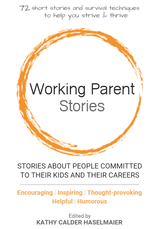|
Submitted by Kathy Haselmaier Editor's Note: The convenient thing about submitting a story to a web site you edit is that you can have conversations, and even debates, with yourself. This story is categorized as "provacative", so let's be clear up-front; I am not suggesting that full-time work is something that every parent will want to pursue, nor should they. Mindful parents make choices that support their unique visions for their families. The purpose of this piece is to stretch minds and encourage people to think and talk about how we can improve things for everyone. A casually asserted online comment got me thinking recently. It stated that an earnings gap between women and men is the reason many young women opt out of the workforce after they have children. It wasn't the first time I'd read the claim, and I doubt it will be the last.
Many young parents find ways to manage both career and family responsibilities, but young women are still leaving the workforce at greater rates than young men. (A 2012 McKinsey Study calls this the "leaky pipeline".) These exits perpetuate stereotypes that suggest women aren't as committed to careers as men. They also send messages to employers who find themselves in a bit of a bind; they value the strong contributions from women, but can't ignore the risks associated with employing them. Since women drop out of the workforce at greater rates than men, the following logical consequences often occur:
Women who opt out of the workforce aren't the only ones that increase the burden for the women who stay. Women who settle for jobs that don't demand their full potential reinforce the stereotype that women aren't capable of handling as much responsibility or pressure as men. This can negatively influence the kinds of opportunities that are available to the women who are striving to reach their full potential. But the fact that young women opt out of the workforce at greater rates than young men, or don't always pursue career challenges as vigorously as men, doesn't always hurt women in the workplace. Most organizations value the benefits provided by diverse work teams and some women possess unique skills or perform at exceptional levels, so in some cases, and especially in male-dominated organizations, the women who remain find themselves receiving special attention and unique benefits. One young mother recently told me, "My husband and I work at the same level and for the same FANG company. We are expecting our first baby soon. Our benefits will provide me with three months of paid medical leave after the baby is born, and then we are both able to take three months of paid parental leave too. It's pretty much assumed that I will take the entire leave. It's also assumed that I am a flight risk, may not return, or I am likely to want part time or flex time if I return. My husband, on the other hand, is not considered a flight risk, and it is assumed he won't want to change his current situation at all. Interestingly I actually end up with way more options. The company is willing to bend over backward to keep me and has proactively offered me part time or extended personal leave options even though I haven't even hinted that I'm interested in any of these things. It's not the same for my husband. He thinks that requesting these options might be career limiting or refused entirely." (If you're looking for a reason to encourage your young daughter to consider non-traditional career options, you may have found it in this comment.) People who are truly committed to influencing change must be willing to make at least some small sacrifices. To influence positive change we need to stand on principle to do the "right" thing instead of the easy, comfortable, or "greedy" thing. Complaining our way to change rarley works. We need to do the hard work of making it happen. We need to take action and lead by example. Women can make things better by participating in the workforce, striving to contribute at higher levels, and showing the world what is possible. Men can support the cause by being consistent cheerleaders and encouraging women to participate in the workforce at levels that utilizes their full potential (not only in roles that are traditional and/or comfortable). Women and men need to be willing to share more responsibilities. For women this may mean striving to achieve more professionally; for men this may mean taking on more food prep, clean up and carpool tasks. People who are managers and in other positions of influence need to advocate for working parents and fair policies. We all need to let go of outdated expectations and do more of the "right" things. We have the power to create the change we want. Let's use it. Nobody has more to gain from this kind of progress than our own children.
Related stories:
0 Comments
Leave a Reply. |
The StoriesArchives
March 2022
Categories
All
|
Photos from barnimages.com, marcoverch, truewonder, donnierayjones, marcoverch, shixart1985, Gustavo Devito, edenpictures, nan palmero, quapan, The Pumpkin Theory, bark, opassande, Semtrio, Ivan Radic (CC BY 2.0), verchmarco (CC BY 2.0), Didriks, shawnzrossi, shixart1985 (CC BY 2.0), madprime, marksmorton, CT Arzneimittel GmbH, NwongPR, franchiseopportunitiesphotos, anotherlunch.com, jdlasica, wuestenigel, Frinthy, romanboed, Doris Tichelaar, quinn.anya, A_Peach, VisitLakeland, MEDION Pressestelle, Darren Wilkinson, bratislavskysamospravnykraj, Anthony Quintano, Danielle Scott, pockethifi, Bridgette Rehg, Martin Pettitt, PersonalCreations.com, wuestenigel, Thad Zajdowicz, archer10 (Dennis) 139M Views, Infomastern, beltz6, The National Guard, futurestreet, daveynin, OIST (Okinawa Institute of Science and Technology), Rinet IT, shixart1985, mikecogh, JeepersMedia, Ryan Polei | www.ryanpolei.com, Jake.Christopher., aleksandrajovovich, thepeachpeddler, wwward0, flossyflotsam, Got Credit, Senado Federal, Corvair Owner, lookcatalog, moodboardphotography, dejankrsmanovic, Carine fel, ElleFlorio, {Guerrilla Futures | Jason Tester}, greg westfall., Arlington County, mariaronnaluna, quinn.anya, wuestenigel, Tayloright, insatiablemunch, MrJamesBaker, Scorius, Alan Light, Monkey Mash Button, www.audio-luci-store.it, wohlford, Vivian Chen [陳培雯], okchomeseller, BoldContent, Ivan Radic, verchmarco, donnierayjones, Czar Hey, US Department of Education, Andrew Milligan Sumo, Michel Curi, anotherlunch.com, ProFlowers.com, Cultural viewpoints from around the world, alubavin, yourbestdigs, Rod Waddington, Tayloright, Wonder woman0731, yourbestdigs, donald judge, Thomas Leth-Olsen, Infinity Studio, shixart1985, wuestenigel, francesbean, Roger Blackwell, MrJamesBaker, Luca Nebuloni, MFer Photography, erinw519, boellstiftung, North Carolina National Guard, A m o r e Caterina, MrJamesBaker, bellaellaboutique, Free For Commercial Use (FFC), Prayitno / Thank you for (12 millions +) view, wuestenigel, Matt From London, MadFishDigital, Kompentenzzentrum Frau und Beruf, mikecogh, CreditDebitPro, marciadotcom, Mr.Sai, _steffen




 RSS Feed
RSS Feed